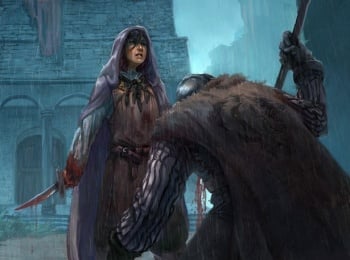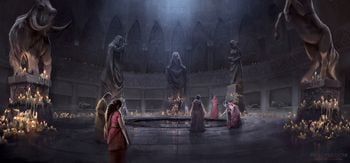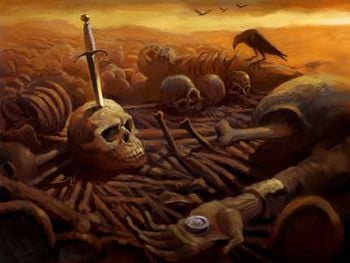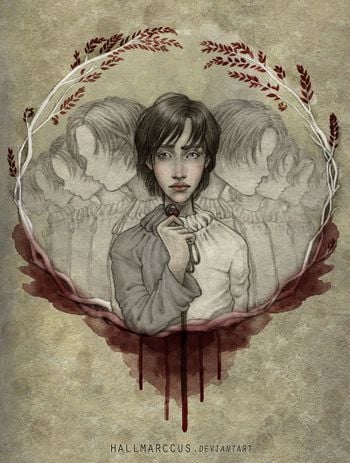Valar morghulis
Valar morghulis translates to "all men must die" in High Valyrian.[1] It is a customary saying in Essos, via Valyria.[2] In Braavos, it is traditionally answered with another Valyrian saying, "valar dohaeris," meaning "all men must serve," and is a password and countersign of the Faceless Men and those who serve them.[3][4][5][6]
Contents
Recent Events
A Clash of Kings

Jaqen H'ghar teaches Arya Stark the words "valar morghulis" when he departs Harrenhal, and gives her a small iron coin, telling her if she ever wishes to find him again, to give the coin to any man of Braavos and say the words.[7] Although he does not explain the meaning to her (nor does anybody else), she begins to use the words with her prayer listing the people she hates and wants dead.[7][8][9][10][11][12]
Just before fleeing Harrenhal with Gendry and Hot Pie, Arya slits the throat of the guard at the postern gate; she whispers "valar morghulis" as he dies.[8]
A Storm of Swords
In Astapor, Queen Daenerys Targaryen frees a young slave translator, Missandei, and tells her she may leave her service, but Missandei wishes to stay. Daenerys warns her that the journey with her may be dangerous, but Missandei replies, "Valar morghulis". Daenerys agrees that all men must die, but hopefully not for a long while.[1]
In King's Landing, Prince Oberyn Martell makes threatening remarks about Lord Tywin Lannister's lifespan, and Tyrion Lannister warns him that Varys's little birds may be listening. Oberyn is unconcerned, stating that valar morghulis, the fact of human mortality, was a saying in Old Valyria.[2]
At Saltpans, Arya sees a ship, the Titan's Daughter, and asks its captain, Ternesio Terys, for passage to the Night's Watch castle Eastwatch-by-the-Sea. Ternesio refuses her, as she has little money, and the north is too dangerous. However, when he says he and the ship are from Braavos, Arya shows him the iron coin that was given to her by Jaqen H'ghar, and says the words "valar morghulis" as Jaqen had taught her. Ternesio replies, "valar dohaeris", and offers her a cabin.[3]
A Feast for Crows

In Braavos, Arya is brought to the House of Black and White, the temple of the Many-Faced God, by Ternesio's son Yorko Terys. The temple's doors are closed and locked, but they open when she raises the iron coin and says "valar morghulis". Inside, Arya sees a young man sitting by a pool and weeping. She fills a cup with water from the pool and offers it to him, to which he says "Valar morghulis", and she replies, "Valar dohaeris".[13]
The kindly man tells Arya that valar dohaeris, all men must serve within the House of Black and White. If she wishes to stay, she must obey the Faceless Men at all times and in every way.[14]
Arya continues to say "valar morghulis" with her prayer.[14]
A Dance with Dragons
Aboard the Shy Maid, Griff tells Tyrion Lannister he may travel with his company along the Rhoyne to Volantis, and if he proves to be obedient and useful, he may continue with them on their journey to Daenerys Targaryen. Tyrion replies "Valar dohaeris".[15]
The Winds of Winter
|
| Warning This information has thus far been released in a sample chapter for The Winds of Winter, and might therefore not be in finalized form. Keep in mind that the content as described below is still subject to change. |
When Harys Swyft is sent to negotiate the Iron Throne's debt to the Iron Bank of Braavos, one of the guards accompanying him is Raff the Sweetling. They attend a performance of The Bloody Hand at the Gate. Arya, posing as the mummer "Mercy", spots Raff and seduces him, taking him to her room, streets away. Once he is undressed, she discreetly cuts his femoral artery, causing him to bleed heavily and rendering him unable to walk. Raff asks her to carry him to a healer, but Arya echoes the words Raff said when he murdered Lommy Greenhands, cuts his throat, and says "valar morghulis".[16]
Quotes
Jaqen: If the day comes when you would find me again, give that coin to any man from Braavos, and say these words to him—valar morghulis.
Arya: Valar morghulis. Please don't go, Jaqen.
Jaqen: Jaqen is as dead as Arry, and I have promises to keep. Valar morghulis, Arya Stark. Say it again.
Arya: Valar morghulis.[7]—Jaqen H'ghar and Arya Stark
Ser Gregor. Dunsen, Polliver, Raff the Sweetling. The Tickler, the Hound. Ser Ilyn, Ser Meryn, Queen Cersei. Joffrey, Joffrey, Joffrey. Valar morghulis.[8]
—Arya Stark's prayer
She liked how the words sounded when she said them.[8]
—thoughts of Arya Stark
Daenerys: I can give you freedom, but not safety. I have a world to cross and wars to fight. You may go hungry. You may grow sick. You may be killed.
Missandei: Valar morghulis.
Daenerys: All men must die, but not for a long while, we may pray.[1]
Arya: Wait, I have something else.
Ternesio: One more silver will make no difference, child.
Arya: It's not silver. It's iron. Here.
Ternesio: This… how…?
Arya: Valar morghulis.
Ternesio: Valar dohaeris. Of course you shall have a cabin.[3]—Arya Stark and Ternesio Terys
Behind the Scenes
Memento mori is a Latin phrase that means "remember that you die", which has been used as a meditative reminder since antiquity. As George R.R. Martin considers High Valyrian to be the known world's cultural equivalent of Latin in the real world,[17] "valar morghulis" presumably serves as the equivalent to memento mori.
In addition, Minas Morgul is the name of an evil city in The Lord of the Rings by J.R.R. Tolkien, a series that George R.R. Martin is a great fan of. However, rather than "death", the word "morgul" in Tolkien's languages means "sorcery" or "necromancy".[18]
References
- ↑ 1.0 1.1 1.2 A Storm of Swords, Chapter 27, Daenerys III.
- ↑ 2.0 2.1 2.2 A Storm of Swords, Chapter 66, Tyrion IX.
- ↑ 3.0 3.1 3.2 A Storm of Swords, Chapter 74, Arya XIII.
- ↑ A Feast for Crows, Chapter 34, Cat Of The Canals.
- ↑ A Dance with Dragons, Chapter 45, The Blind Girl.
- ↑ A Dance with Dragons, Chapter 64, The Ugly Little Girl.
- ↑ 7.0 7.1 7.2 A Clash of Kings, Chapter 47, Arya IX.
- ↑ 8.0 8.1 8.2 8.3 A Clash of Kings, Chapter 64, Arya X.
- ↑ A Storm of Swords, Chapter 3, Arya I.
- ↑ A Storm of Swords, Chapter 17, Arya III.
- ↑ A Storm of Swords, Chapter 39, Arya VII.
- ↑ A Storm of Swords, Chapter 47, Arya IX.
- ↑ A Feast for Crows, Chapter 6, Arya I.
- ↑ 14.0 14.1 A Feast for Crows, Chapter 22, Arya II.
- ↑ A Dance with Dragons, Chapter 8, Tyrion III.
- ↑ The Winds of Winter, Mercy
- ↑ Tharoor, Ishaan (3 May 2013). "Tongues of Ice and Fire: Creating the Languages in Game of Thrones". Time.com. http://entertainment.time.com/2013/05/03/tongues-of-ice-and-fire-creating-the-languages-of-game-of-thrones/.
- ↑ Tolkien Gateway: Morgul

